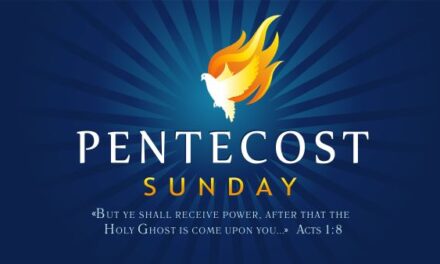Habits of the Heart: “Celebration”
By Dr. Jack R. Hodges, Jr.
Burke County 
With this issue, we come to the end of a year-long study of Spiritual Disciplines. The Blue Ridge Christian News has offered me an opportunity to share with you an in-depth look at one of the most important aspects of living the Christian life, that is, growing in Christ. Growth takes work. Any follower of Christ must be committed to the process of learning and being equipped to be a faithful witness to the Lordship of Christ. Just as constant exercise is crucial to maintaining optimum physical health and fitness, so also practicing spiritual disciplines fundamental is to maintaining spiritual health and fitness. Committing yourself to and practicing these twelve spiritual disciplines will keep you fit and allow you to be a powerful witness of Jesus to a lost and dying world.
The disciplines that we have already covered include meditation, prayer, fasting, study, simplicity, solitude, submission, serving, confession, worship, and guidance. The final “habit of the heart” is a celebration.
Richard Foster, from whom I have borrowed these twelve discipline titles (Celebration of Discipline: The Path to Spiritual Growth, Richard Foster. HarperCollins Publishers, 1984), says “Celebration is at the heart of the way of Christ. He entered the world on a high note of jubilation: “I bring you good news of a great joy,” cried the angel, “which shall come to all the people” (Lk. 2:10).
When God sent His Son into this world, He declared once and for all that He was not giving up on His wayward creation. Through countless generations, God had shown them His love, mercy, grace, and His character of love, patience, kindness, forgiveness, as well as strength and authority. And yet, mankind still didn’t get it. They continually tried to make their own way to live and survive. And they continually tried to find their own way to God. Mankind’s efforts helped them to survive—but kept them separated from God as sin and rebellion propelled them towards destruction. And time and time again, God would bring them back and offer them forgiveness and renew His invitation to know Him and serve Him alone.
When God, in the fullness of time, offered His Only Begotten Son, Jesus, there was cause for celebration. Once and for all, God made a way where there was no way for His precious creation to find and receive forgiveness and be reconciled to God for all eternity. God offered them eternal salvation and the promise of the right relationship that would last for all eternity.
We offer gifts to honor the one whom we are celebrating. Often, one of the greatest problems in life is that we do not celebrate accomplishments, much less the blessings and gifts that God pours out upon us. In our busy, demanding, and the self-driven world, we usually get trapped into going from one task to another. As soon as one job is successfully completed, we immediately jump into another. In so doing, we have become trapped by Satan’s lie that we have to prove ourselves (over and over again). The result is that we are never satisfied—so we never rest! We are never quenched or filled—so we keep on searching! We are never content—so we never celebrate. We never celebrate—so we don’t experience “joy unspeakable and full of grace.” For as Foster correctly observed, “Celebration brings joy into life and joy makes us strong.” Joy is what keeps us and sustains us through all of the difficulties of life and joy is the foundation of celebration. Foster argues that it is “central to all the Spiritual Disciplines.” “Without a joyful spirit of festivity,” he declares, “the Disciplines become dull, death-breathing tools in the hands of modern Pharisees.”
The word “joy” is found no less than 180 times in the Scriptures. Here are just a few:
In 1 Chronicles 16, we read that when David succeeded in bringing the Ark of the Covenant back to the city of David. We read in 13:8, “They carried the ark of God on a new cart from the house of Abinadab, and Uzza and Ahio drove the cart. David and all Israel were celebrating before God with all their might, even with songs and with lyres, harps, tambourines, cymbals and with trumpets.” When the Ark arrived, David assigned Asaph and his relatives to give thanks to the Lord. Thus, began a great song of praise and adoration (“Oh give thanks to the Lord…”—what has been called a “sacred song” or “song of God”). A song of God brought joy and celebration and a song of praise always brings joy and celebration. If our praise doesn’t bring joy, then the chances are that we are not singing “God’s song” but our own!
In Ezra 6:16 we find that when the sons of Israel completed the house of God, they “celebrated the dedication of this house of God with joy.” And they then observed the Feast of Unleavened Bread seven days with joy (cf. Ezra 6:22).
In Nehemiah 12:43 we read that when Nehemiah and the workers had finished building the wall around Jerusalem, that “on that day they offered great sacrifices and rejoiced because God had given them great joy, even the women and children rejoiced, so that the joy of Jerusalem was heard from afar.”
Over and over in the Old Testament, God’s people celebrated God’s goodness and blessings, His manifest presence and power, and His glory and honor by celebrating with joy.
In the New Testament, there was exceedingly great joy surrounding the birth of the Savior, the promised Messiah. That joy was announced, was seen, and witnessed, and was experienced deeply and profoundly. Jesus lived that joy and proclaimed that joy. He said in John 15:11, “These things I have spoken to you so that My joy may be in you, and that your joy may be made full.” In John 16:22 Jesus foretold, “Therefore you too have grief now; but I will see you again, and your heart will rejoice, and no one will take your joy away from you.” And in John 16:24, Jesus spoke of the joy that was theirs in Him. “Until now you have asked for nothing in My name; ask and you will receive, so that your joy may be made full.” He spoke of that joy again in John 17:13, “But now I come to You; and these things I speak in the world so that they may have My joy made full in themselves.”
Paul filled his letters and epistles with references to joy and the joy of the Lord. In Romans 15:13, “Now may the God of hope fill you with all joy and peace in believing, so that you will abound in hope by the power of the Holy Spirit.” In 2 Corinthians 2:3, he wrote, “This is the very thing I wrote you, so that when I came, I would not have sorrow from those who ought to make me rejoice; having confidence in you all that my joy would be the joy of you all.” And in Galatians 5:22-23 Paul described joy as one of the fruits of the Spirit, “But the fruit of the Spirit is love, joy, peace, patience, kindness, goodness, faithfulness, gentleness, self-control; against such things there is no law.”
God has offered the greatest gift that was ever given, Jesus—and He invites us to celebrate His Son and the salvation and freedom that He offers each one of us through Him.
Twelve Habits of the Heart—twelve spiritual disciplines for all Christians. Let me end by paraphrasing Foster’s eloquent summary and synopsis of the twelve (p. 171):
We have seen how méditation prepares us to meet the Lord and leads us into His presence through prayer. When we find ourselves in Jesus’ presence, the discipline of fasting calls us to release all that stands between us and our Lord. Those three disciplines move us into the study, which gives us discernment about ourselves and the world in which we live. As we study God’s Word, we get to know who He is and who we are as His people, His spiritual children. Through simplicity, we live with others in integrity, rather than for ourselves. Solitude allows us to genuinely be present with God and with others. Through submission, we are called to live free and practice giving and sacrificing (just as Jesus did). Simplicity, solitude, and submission allow us to serve the Lord and one another out of our love and giftedness. We, then, become blessings to others. Confession frees us from our bondage to sin, guilt, and allows us to worship the Lord with thanksgiving and gratitude. As we worship the Lord, we are called to guide others to know Him, know His love, and know His healing and restorative power. And when we practice all of the spiritual disciplines, our joy will overflow with celebration.
Our goal as believers and followers of Christ our Savior is to live for Him and for His glory. As you and I live out our calling, we join all the saints before us in answering Paul’s challenge found in Philippians 3:14, “I press on toward the goal for the prize of the upward call of God in Christ Jesus.” Blessings and peace as you live out these habits of the regenerated heart.
_______________________________________________________________________________
Dr. Jack Hodges is the Senior Pastor at Pleasant Hill Baptist Church in Morganton, NC. He has served as a pastor, a biblical counselor, and an International Mission Board missionary. You can read more good Christian news from Dr. Jack Hodges HERE.
______________________________________________________________________________







